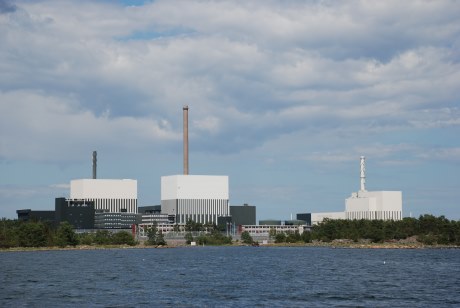German utility Eon has decided that units 1 and 2 of the Oskarshamn nuclear power plant in Sweden will be shut down permanently. Unit 3 is unaffected by the decision, which was announced today by OKG AB, of which the EOn group is the major shareholder.
 |
| The three-unit Oskarshamn plant (Image: OKG) |
OKG, which turns 50 this year, owns and operates the three Oskarshamn units that together account for 10% of total electricity generation in Sweden.
The announcement followed an extraordinary shareholders' meeting held earlier today and is in line with the "policy decision" EOn communicated in July. According to that policy, EOn said unit 1 would close between 2017 and 2019 and unit 2 by 2020. Minority owner Fortum has said it opposes the early shutdown of the units.
"This is naturally a tremendously sad decision for me as well as for our employees," OKG managing director Johan Svenningsson said. "Any immediate dismissal notices due to the decision on the shutdown are not considered necessary in the short term, but planning has been initiated regarding adjusting the organisation based on the conditions that we now have to adapt to. Such a process will obviously be handled in a responsible manner with focus on safety."
There will be no future investments at unit 2 and the reactor will not be restarted. Operation of unit 1 will proceed in accordance with the established plan, meaning a decision on its shutdown will be made when the time schedule for the decommissioning phase has been prepared. The exact date when the unit will be permanently shut down is thus not yet established, OKG said. Unit 3 is "considered able to continue the production of climate-friendly electricity during its entire technical lifetime", until 2045, OKG said.
Svenningsson added: "There will still be major development possibilities at OKG, particularly now when we will have three nuclear facilities in three entirely different phases of the life cycle. In order to have maximum safety in all situations, we need employees with special competence and qualifications."
OKG stressed that EOn's decision is not based on safety related reasons, but on continuously low wholesale electricity prices, the burden of Sweden's tax on nuclear power and "additional requirements on extensive investments". These factors mean, it said, "there are no prospects of generating financial profitability either in the short or the long term" at either unit 1 or 2.
Earlier this month, the European Court of Justice ruled that Sweden can continue to tax nuclear power production, deciding that the levy does not fall within the scope of two European Council Directives and is therefore a national, rather than European Commission, matter. OKG AB had first contested the tax in 2009 in the Swedish courts.
EOn's statement in July on unit 1 and 2 came just days after OKG applied for an environmental court ruling in preparation for the future decommissioning of Oskarshamn unit 1, a 473 MWe boiling water reactor (BWR) that started up in 1972. Oskarshamn 2 is a 638 MWe BWR which began operating in 1974. Oskarshamn 3 is a 1400 MWe BWR which began operating in 1985.
Researched and written
by World Nuclear News














